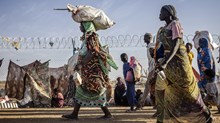"I only know one thing – our hope has not died, it is not buried in that rubble."
Tara Livesay, a missionary in Haiti ended yesterday's post – stories of kindness, stories of goodness, stories of thankfulness and humor – with those words.
The reports of violence – we don't get those. Have not seen it. Have not experienced it. Nothing even remotely close. People are helping each other and are warm and kind and humble. People are seeking each other out and checking to see how friends/acquaintances are recovering.
This is the Haiti many relief organizations know exist. This is the Haiti they have every intention of helping rebuild. And that, says Ron Flaming of Mennonite Central Committee, is where rebuilding gets tricky.
Mennonite Central Committee (MCC) has worked with churches in Haiti for more than 50 years. Their response, like many relief and development agencies, will include short-term relief plus recovery efforts over the medium- and long-term.
"We're looking carefully at how we can build peace, avoid violence and do good community development at the same time," says Daryl Yoder-Bontrager, MCC Latin America and the Caribbean director.
Flaming, MCC director of international programs, emphasizes that rebuilding is about coming alongside the Haitians – not taking over for them.
We're trying really hard to start at the other side and say, "We're confident the [Haitian] church has resources in leadership, passion, vision. How can we put the church leadership in front, even in the assessment of needs?
It's not just a matter of sending in more resources; Haiti's getting a lot of that. What's really needed is…asking church leaders: "How do they see themselves responding to this? How can we help them?" Rather than, "Here's what we can do and can you help us."
The benefit and the challenge of a disaster so close to home, American relief agencies agree, is the personal connection so many individuals and churches have through mission trips and missionaries in Haiti.
"It's close to the US, so more people can get involved and help," says Peter Howard, director of public policy for Food for the Hungry. But Howard has a caution, as well.
We want the church to rise up and respond, but the church has to be careful. We can have good-hearted people, but how good will the response be? I hope it is a two-way street of learning from them and being of assistance to them. This is a great opportunity for a reset button to be hit on the North American / Haiti partnership – so Haiti is not forgotten.
The challenge, says Flaming, is "when you have folks coming in, and haven't had much reflective thinking on how to respond to a disaster without taking over local initiatives. Don't undercut the Haitians.
"There are a lot of well-intended people; the challenge is how to channel that so it is not harmful. We're trying to keep Haitians in charge of their own future."
Those in America longing to help, stymied in the frustration of not being able to do something, may consider making Peter Howard's prayer their own:
I'm praying right now that the church will truly rise up and be the church. Instead of being known for some of the comments made in the news, we'd be known for our actions – that our response would be excellent, efficient, and compassionate.
The other prayer that I have is that Haitian Christian leaders will rise up. The government, by its own admission, has ceased to function for a time. Our prayer as things kick back in is that Christians would step up and form compassionate leadership. Not to be exclusive or take over, but to join in the efforts.

Support Our Work
Subscribe to CT for less than $4.25/month


















